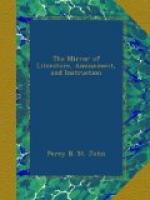“That assembly met at London, on the 22nd of January, 1265, according to writs still extant, and the earliest of their kind known to us, directing ’the sheriffs to elect and return two knights for each county, two citizens for each city, and two burgesses for every burgh in the county.’ If this assembly be supposed to be the same which is vested with the power of granting supply by the Great Charter of John, the constitution must be thought to have undergone an extensive, though unrecorded, revolution in the somewhat inadequate space of only fifty years, which had elapsed since the capitulation of Runnymede; for in the Great Charter we find the tenants of the crown in chief alone expressly mentioned as forming with the prelates and peers the common council for purposes of taxation; and even they seem to have been required to give their personal attendance, the important circumstances of election and representation not being mentioned in the treaty with John;—neither does it contain any stipulation of sufficient distinctness applicable to cities and boroughs, for which the charter provides no more than the maintenance of their ancient liberties.
“Probably conjecture is all that can now be expected respecting the rise and progress of these changes. It is, indeed, beyond all doubt, that by the constitution, even as subsisting under the early Normans, the great council shared the legislative power with the king, as clearly as the parliament have since done.[3] But these great councils do not seem to have contained members of popular choice; and the king, who was supported by the revenue of his demesnes, and by dues from his military tenants, does not appear at first to have imposed, by legislative authority, general taxes to provide for the security and good government of the community.—These were abstract notions, not prevalent in ages when the monarch was a lord paramount rather than a supreme magistrate. Many of the feudal perquisites had been arbitrarily augmented, and oppressively levied. These the Great Charter, in some cases, reduced to a certain sum; while it limited the period of military service itself. With respect to scutages and aids, which were not capable of being reduced to a fixed rate, the security adopted was, that they should never be legal, unless they were assented to at least by the majority of those who were to pay them. Now these were not the people at large, but the military tenants of the crown, who are accordingly the only persons entitled to be present at the great council to be holden for taxation. Very early, however, talliages had been exacted by the crown from those who were not military tenants; and this imposition daily grew in importance with the relaxation of the feudal tenures, and the increasing opulence of towns. The attempt of the barons to include talliage, and even the vague mention of the privileges of burghs, are decisive symptoms of this silent revolution. But the generally feudal character of the charter and the main object of its framers prevailed over that premature, but very honest, effort of the barons.”




